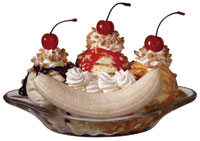The Psychology of Sugar
By Jo Lynn Orr
 Sugar is brain food. As the main attraction in ice cream, pastries, lollipops, and the like, it keeps us dreaming and scheming of ways to satisfy our sweet cravings. In the form of glucose, it’s the premium fuel source that keeps the mental engine running smoothly; without it we become weak, confused, and disoriented.
Sugar is brain food. As the main attraction in ice cream, pastries, lollipops, and the like, it keeps us dreaming and scheming of ways to satisfy our sweet cravings. In the form of glucose, it’s the premium fuel source that keeps the mental engine running smoothly; without it we become weak, confused, and disoriented.
“I call the brain the SUV of organs because it’s a glucose hog,” says UAB psychologist Mary Boggiano, Ph.D., an expert on eating disorders. And sugar, she says, has always been the brain’s fill-up of choice.
“We tend to think of sugar as refined products such as peanut-butter cups, but sweet foods were sought out long before food became commercialized, packaged, and preserved,” says Boggiano. “As far back as caveman days, anything sweet was sought after. We have to learn to like anchovies and coffee. Babies don’t care for the taste of those foods, but they take right to sugar, which is in lactose and breast milk. So we’re wired to love and get reward from eating sugar.”
This is partly because sugar has lots of calories, Boggiano notes, and “plentiful calories translate into staying alive.” Sweetness is also often a natural marker of edibility. “Poisons taste bitter. So if you’re lost in the forest, and you don’t know what plants to eat, ingest the sweet ones.”
The glow imparted by a piece of chocolate is more than a feeling. Research—including Boggiano’s study of rats that ate Oreo cookies on a daily basis—shows that sweets actually decrease the secretion of stress hormones in the brain and adrenal glands. “So part of our innate drive to really like sweet foods may be due to their ability to reduce stress reactivity,” she says.
CAKES UNDER PRESSURE
The sweet drive is often benign; it can even be helpful when a psychological pick-me-up is needed. Most of us find solace in a bowl of ice cream or wedge of brownie after a tough day. But for women and men struggling with eating disorders, any comfort is swallowed up in continual craving for food—and an overriding fear of weight gain once that food is consumed. Their stress relief is as short-lived as the last candy bar or cupcake, which leads to a vicious cycle of binge eating and fasting.
“In binge eaters, the appetizing effect of a bite of anything tasty, such as a peanut, potato chip, or jelly bean, is powerful and very difficult to stop once started,” says Boggiano. “We see the same effect in animal models, which tells us something more is going on here than self-rationalizations such as, ‘Oh, I broke my diet; I might as well keep eating’ or ‘I’ll start dieting tomorrow.’” In Boggiano’s studies, animals with a history of dieting responded to stress just like humans who have been through cycles of weight-loss attempts: by binge eating. The animals binged even though they were not hungry, and they ate much more than rats with no history of dieting and stress.
This may actually be adaptive, says Boggiano. “Your brain thinks, ‘Oh, I may go through another week without food or with reduced calories, so I had better eat a lot now,’” she says. “Binge eating is, I believe, a very normal and adaptive response to a not-so-normal habit of drastic dieting.”